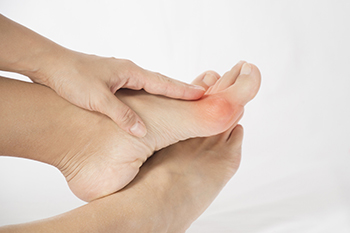1648 US Highway 130
North Brunswick, NJ 08902
 Women usually are more likely to develop bunions more frequently than men. They can gradually form as a result of wearing high heels or shoes that do not have adequate room for the toes to move freely in. A noticeable symptom of a bunion can consist of a large and bony protrusion that is positioned on the side of the big toe. It can be accompanied by pain and discomfort, and it may be difficult to wear shoes. Some patients find relief by frequently performing specific stretches, or wearing a cushion inside the shoe. If you notice a bunion that is beginning to develop, it is suggested that you schedule an appointment with a podiatrist who can offer you treatment options, which may include surgery for permanent removal.
Women usually are more likely to develop bunions more frequently than men. They can gradually form as a result of wearing high heels or shoes that do not have adequate room for the toes to move freely in. A noticeable symptom of a bunion can consist of a large and bony protrusion that is positioned on the side of the big toe. It can be accompanied by pain and discomfort, and it may be difficult to wear shoes. Some patients find relief by frequently performing specific stretches, or wearing a cushion inside the shoe. If you notice a bunion that is beginning to develop, it is suggested that you schedule an appointment with a podiatrist who can offer you treatment options, which may include surgery for permanent removal.
If you are suffering from bunion pain, contact Dr. Robert Fink of Brunswick Foot & Ankle Group. Our doctor can provide the care you need to keep you pain-free and on your feet.
What Is a Bunion?
Bunions are painful bony bumps that usually develop on the inside of the foot at the joint of the big toe. As the deformity increases over time, it may become painful to walk and wear shoes. Women are more likely to exacerbate existing bunions since they often wear tight, narrow shoes that shift their toes together. Bunion pain can be relieved by wearing wider shoes with enough room for the toes.
Causes
Symptoms
In order to diagnose your bunion, your podiatrist may ask about your medical history, symptoms, and general health. Your doctor might also order an x-ray to take a closer look at your feet. Nonsurgical treatment options include orthotics, padding, icing, changes in footwear, and medication. If nonsurgical treatments don’t alleviate your bunion pain, surgery may be necessary.
If you have any questions, please feel free to contact our office located in North Brunswick, NJ . We offer the newest diagnostic and treatment technologies for all your foot care needs.